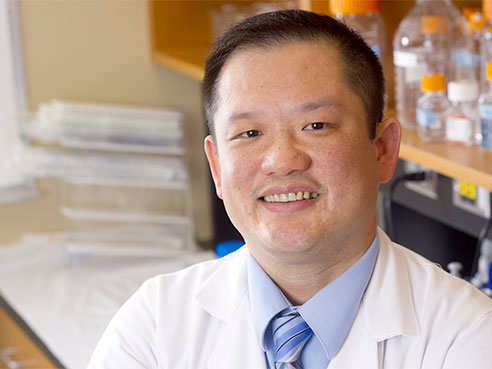 Eddy Yang M.D., Ph.D.The University of Alabama at Birmingham Comprehensive Cancer Center announces its partnership with Strata Oncology to provide patients with advanced or rare cancers with tumor profiling or sequencing at no cost. This will include primarily those with metastatic disease or whose tumors cannot be removed surgically, and will also be available to all glioblastoma and pancreatic cancer patients.
Eddy Yang M.D., Ph.D.The University of Alabama at Birmingham Comprehensive Cancer Center announces its partnership with Strata Oncology to provide patients with advanced or rare cancers with tumor profiling or sequencing at no cost. This will include primarily those with metastatic disease or whose tumors cannot be removed surgically, and will also be available to all glioblastoma and pancreatic cancer patients.
“The goal of precision medicine is to precisely treat the patient’s tumor based on what is driving the tumor,” said Eddy Yang M.D., Ph.D., professor and vice chair of Translational Sciences in the UAB Department of Radiation Oncology and director of the UAB Molecular Tumor Board. UAB is Alabama’s leading provider of genomic and precision medicine, and Yang leads the precision medicine efforts at the UAB Comprehensive Cancer Center. “Through the Strata Trial, we are providing access for advanced cancer patients to profile their tumor at the DNA or genetic level. We will look for key mutations or changes in copy number of cancer genes and, based on that, match the patient to the best possible clinical trial, or most innovative therapy available.”
Advanced cancer patients are often unaware of the molecular features of their disease and the opportunity for entry into lifesaving clinical trials. There are hundreds of ongoing studies enrolling genetically defined patient populations. However, most patients do not undergo routine tumor genome sequencing, so eligibility for such studies remains unknown to patients, all while trial investigators struggle to find patients for these trials.
 “Strata Oncology is proud to be working with UAB to provide an unprecedented and streamlined approach to accelerate precision medicine for cancer patients,” said Dan Rhodes, Ph.D., chief executive officer of Strata Oncology. “Our goal is to dramatically expand patient access to tumor sequencing and precision medicine trials, and to accelerate the approval of breakthrough cancer medicines.”
“Strata Oncology is proud to be working with UAB to provide an unprecedented and streamlined approach to accelerate precision medicine for cancer patients,” said Dan Rhodes, Ph.D., chief executive officer of Strata Oncology. “Our goal is to dramatically expand patient access to tumor sequencing and precision medicine trials, and to accelerate the approval of breakthrough cancer medicines.”
By working with institutions like UAB, Strata is planning to sequence 100,000 patients in the next three years.
Tumor profiling requires a sample of the tumor tissue, although the Strata Trial does not require a new procedure. This can be banked tissue or from a new biopsy if that is part of standard of care. Once the sequencing is complete, a report detailing tumor mutations will be sent to UAB. Then UAB’s Molecular Tumor Board, composed of a multidisciplinary team of experts, will discuss the results of the profiling and, if appropriate, match the patient with a clinical trial at UAB or recommend off-label use of an FDA-approved drug. Patients with a matching trial will be screened for additional eligibility criteria and then be enrolled in a trial.
Not all patients who have their profiling done will match to a clinical trial. “Perhaps the most important key in this groundbreaking effort is that the physicians and the patients will be equipped with information up front and sooner about their cancer, and that can go a long way,” Yang said.
On average, tumor profiling costs about $4,000 per test; however, with this partnership patients can get it at no cost, outside of their typical co-pays.
“Our mission is to provide the highest quality of care for those diagnosed with cancer, and now it will be enhanced greatly by participating in the Strata Trial, which will enable UAB to make tumor sequencing the norm rather than the exception for advanced cancer patients,” said Edward Partridge, M.D., director of the UAB Comprehensive Cancer Center.
“Although there are cost benefits and the opportunity to better understand and treat cancer, this partnership ultimately benefits our patients — gleaning the most important information about a patient’s specific tumor, for their specific body, to treat their specific cancer.”
UAB is at the forefront of innovative patient care with its precision medicine efforts. Most recently, Matthew Might, Ph.D., a renowned computer scientist and strategist appointed to the White House Precision Medicine Initiative by President Barack Obama, was appointed the inaugural director of the Hugh Kaul Personalized Medicine Institute at the UAB School of Medicine.
UAB also introduced the most ambitious single state effort ever undertaken with The Alabama Genomic Health Initiative, a $2 million project to obtain genetic health information from 10,000 Alabamians over five years.
The UAB Comprehensive Cancer Center plans to broaden its scope in utilizing the Strata Trial by bringing it to participating regional associate hospitals and cancer centers in Alabama, Florida, Georgia and Mississippi.
Those interested in seeing a UAB physician should call UAB HealthFinder at 205-934-9999 or toll-free at 800-822-8816 and ask about the Strata Trial to schedule a new patient appointment with the UAB Division of Hematology and Oncology. Those currently being treated for cancer should ask their physician for a referral to the UAB Division of Hematology and Oncology to learn about their eligibility for the Strata Trial.